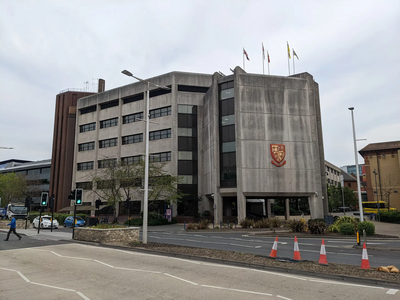- Report concludes past investment decisions have left an unprecedented legacy.
- A raft of historical failings by previous administration revealed.
- A history of inadequate or missing property valuations, record keeping and business cases is catalogued.
- Liberal Democrats welcome conclusion that any realistic route to financial sustainability needs external support.
- A decade of hubris, the investment portfolio of a City run like a small district council.
Woking Liberal Democrats have welcomed the stark conclusions of a rigorous Government report published on Thursday 25th May. This official document concluded "As a result of past investment decisions, the council has failed its best value duty leaving an unprecedented legacy for the current leadership team".
Government reviewers established that the council's budget leaves no room for the repayment of debt of this scale and that there is no 'realistic route to the Council returning to financial sustainability alone'.
The report also identifies many of the longstanding causes of the Borough's extraordinary financial failure, focusing on leadership failures by the past Conservative administration to build necessary capacity to match its ambitions. It found that 'The new leadership team is essentially rebuilding most internal processes as they had not been fit for purpose'.
The report also found there had been 'inadequate attention to short term financial viability' and investment decisions were made without 'appropriate business cases and records of robust land valuation'. The reviewers, now appointed as Commissioners, concluded 'The council had the corporate capacity of a small district council, yet the investment portfolio of a very large city/metropolitan council.'
Cllr Ann-Marie Barker, Leader of Woking Borough Council since May 2022, comments: "The report recognises the new corporate and political teams, highlights our manifesto commitment to get the council's finances under control and commends the new team for taking a systematic approach, establishing our Woking For All Strategy, the iterative approach we have taken to the Medium Term Financial Strategy and for proactively commissioning external advice. This report also recognises the commitment and talent of council officers at all levels in Woking".
Cllr Dale Roberts, Portfolio Holder for Finance and Economic Development at Woking Borough Council, comments: "We welcome the report. It confirms our mounting suspicions over the years that Borough finances were not what was being claimed.
"Even after we intervened with an opposition motion that led to an independent financial review, commissioned in 2021, the former Conservative leadership claimed that council finances were 'good' and there was a positive net asset position. It is now abundantly clear that this was untrue.
"It is somewhat ironic that the current Conservative leader - even now - criticised the Lib Dems for scaremongering on the day that the council was put into special measures. We can't begin to put a solution in place until we all admit the scale and nature of the problem".
"What is most encouraging is the level of alignment between the government appointees and the executive on next steps. We introduced what we have termed 'the four pillars' in our budget in February. These focus on stronger governance, efficiencies, optimising assets, and restructuring borrowing. Support proposed in the report includes transformation, resolving the legacy lending arrangements, and achieving the best possible value for the property portfolio".
Looking ahead towards next steps, Cllr Roberts concludes: "Decisions will be challenging but this demonstrates that there is no appetite for short-term, knee-jerk solutions such as a fire sale of assets. We are all focused on outcomes that are in the best and long-term interests of the Borough and for local residents."
Note on timings: The report was constructed in two phases. Firstly, during January and February this year. Secondly, in May 2023 as initial findings emerged from work the Council had commissioned from the Chartered Institute of Public Finance and Accountancy.
Notes and references to the report "Governance, Financial and Commercial Review of Woking Borough Council" for the Secretary of State for Levelling Up Housing and Communities
THE REPORT IN FULL: https://assets.publishing.service.gov.uk/government/uploads/system/uploads/attachment_data/file/1159098/Woking_Borough_Council_-_External_Assurance_Review.pdf
THE ACCOMPANYING LETTER IN FULL:
https://assets.publishing.service.gov.uk/government/uploads/system/uploads/attachment_data/file/1159179/Woking_Borough_Council_-_Letter_setting_out_the_intervention_package.pdf
EXCERPTS FROM PART 1:
- The new leadership team is essentially rebuilding most internal processes as they had not been fit for purpose. Management information to inform decision making is recognised as inadequate and plans are in place to rectify this. Financial information does not currently enable managers to be agile in their approach to departmental budgets. The constitution is being reviewed. New company governance and processes have been put in place from October 2022 to manage the companies with the establishment of a Shareholder Advisory Group (SAG). The council's approach to procurement is being redeveloped as are its processes for change management, digitisation, and transformation. All these developments are in their early stages, nevertheless the review team recognise that these initiatives are required and have the correct direction of travel.
- There are some very committed and talented members of staff at all levels in Woking, particularly at the senior level. New staff brought in have made a positive difference to the skills required within the council. Despite this, there is not enough capacity or capability to manage the significant number of issues the council is now facing. In reshaping the council, new skills and approaches can be built up in most areas, but this will take time that the council does not have.
- It is difficult to conclude the council has complied historically with accounting best practice and the Prudential Framework. The scale of borrowing was disproportionate to the council's assets and ability to manage complex commercial activity. There was insufficient regard to the level of risk the council was being exposed to. The decisions to invest were made in line with the constitution, assessed against the Prudential Framework, the 2018/19 and earlier accounts had unqualified VfM opinions. However, given the scale of the borrowing and the fact that future risks of refinancing were not considered it cannot be argued that the approach had been prudent. The arrangements put in place for VSWL and Sheerwater were taken without an adequate assessment of the risks to the council or a full assessment of the legal considerations, including state aid/subsidy, best value consideration and the structure of the financing arrangements.
- The leadership of the council has changed at an officer and political level since the major commercial decisions were made. The new leadership team is to be commended for a systematic and whole systems approach to establish and address the council's financial challenge and to fundamentally redesign governance. The establishment of the 'Woking for All' strategy and the iterative approach to the Medium-Term Financial Strategy, alongside management of risk, commissioning independent advice and reviews, has established that the financial position of the council is significantly worse than the position set out in March 2021 at the time of the application to DLUHC for Exceptional Financial Support. These positive steps in the most part remain in their infancy, with concerted efforts from autumn 2022. The direction of travel is encouraging; however, time is not a luxury the council has due to its current financial position.
- There had been a long-term regeneration focus without adequate attention to short term financial viability of the council and the associated risks of the scale of these investments on the council's budget. Many of the regeneration business cases had a 50-year plus time horizons.
- There had been little capacity and capability put in place to manage the scale of commercial activity, the client function was inadequate. The council had the corporate capacity of a small district council, yet the investment portfolio of a very large city/metropolitan council. Despite best recent efforts of the new leadership team, the council still lacks capacity to deal with this scale of commercial activity.
- There is some evidence to suggest that some investment decisions were made without appropriate business cases and records of robust land valuation. In some cases, project scope had been increased and budgets had to be extended. For example, the scope of Victoria Square had increased from the initial approval of approximately £460m in November 2016 to £700m in February 2021. Some strategic asset acquisitions lacked evidence of robust valuation, which resulted in borrowing more than the asset value.
- Not enough attention had been given to consider the council's financial resilience and its risk profile. It was the belief that the council's commercial income and its ability to take margins on loans to companies would cover any financial eventuality. This has proved not to be the case. [Content redacted for commercial sensitivity.]
- The organisation now has a five-year corporate plan, 'Woking for All'. It sets out the policy priorities of the administration; healthier, engaged, greener and prospering communities, underpinned by an overarching need for a high performing council. The plan was formulated following member, community roadshow and senior manager engagement. The community engagement was in response to an independent resident survey undertaken in 2020/21. According to the survey, residents valued the services provided by the council, but they did not trust the council (based on the levels of reported debt).
- The new administration from May 2022 set out its post manifesto priorities and the first of these was noted as 'Getting the council's finances under control'.
- The corporate plan has more than 200 actions which are monitored. The progress on the actions was reported to the Executive on 6th October 2022 and again on 2nd February 2023. According to the council reports, over 80% of the actions were rated as green, achieved or on target.
EXCERPTS FROM PART 2: 5 May 2023
Nature and urgency of additional support required
- The key priorities can be divided into three inter-related workstreams: handling the technical legacy of the borrowing and lending arrangements; effective management of the asset portfolio; and a wholesale review of the size and shape of the Council to quickly identify ways of cutting costs to bring the organisation's spending in line with its size. The details of these workstreams are outlined below.
- Resolving the legacy issues on debt and lending arrangements. The Council faces a legacy of technical issues including the revolving credit facility, the portfolio of assets and the ultra vires factor of the revolving loans. [Content redacted for commercial sensitivity.]
- The Council need to develop and enact a strategy to achieve the best possible value for their property portfolio. This may include maximising profit of the property portfolio which would include increasing capacity within the property team and seeking external opinions on how best to do this. The Council require help in the management of their asset stock, and this is probably best achieved if passed out of Council control. There are different options to achieve this, including partnering with development companies or central government.
- Transformation of the Council to achieve savings and efficiencies. The Council must prioritize service transformation to achieve cost savings and efficiencies commensurate with its size. This will require difficult decisions, including rationalising some 'County-level' services and developing exit strategies for other services. The Council needs to address issues with its treasury management and capital accounting systems, which require consolidation and additional specialist resource The Section 151 officer is working to position the Council to tackle these issues on a macro scale. However, the Council's limited experience with service transformation on the required scale highlights the need for expert support to manage this process effectively.
- In conclusion, as a result of past investment decisions, the Council has failed its best value duty leaving an unprecedented legacy for the current Leadership Team, which they have not been able to address to prevent financial failure.

